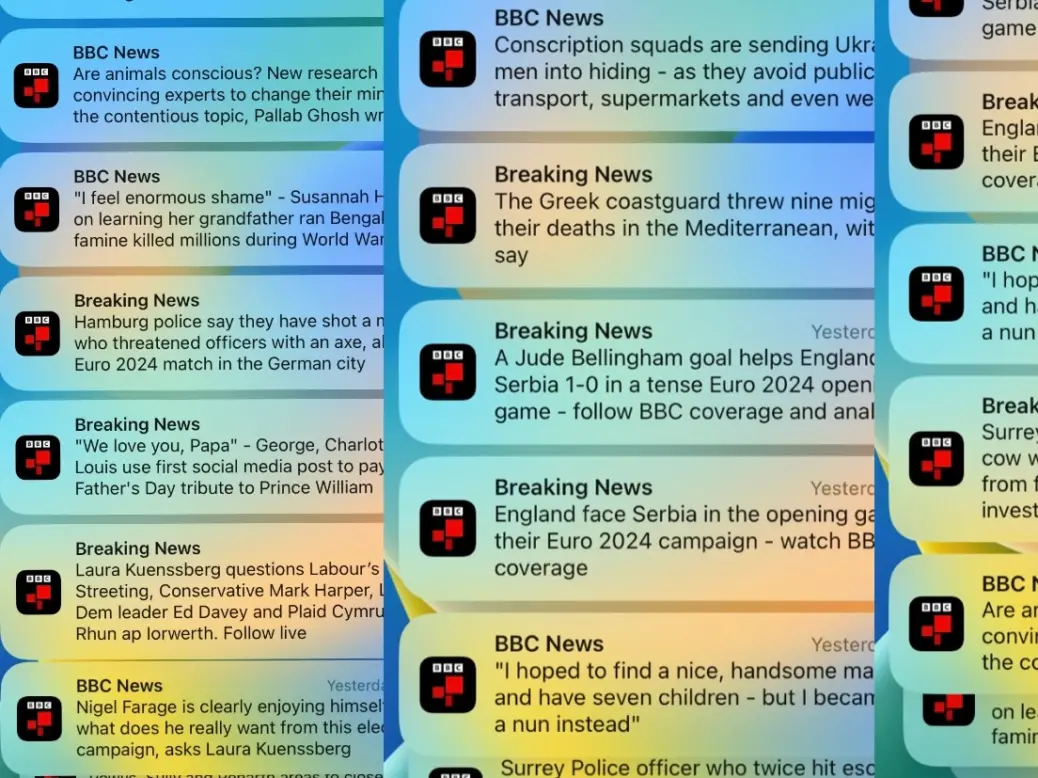
The BBC News has sent out 68 push notifications about the election since it was called on 22 May, Press Gazette analysis has found.
Of the more than 170 notifications sent since Rishi Sunak announced the dissolution of Parliament last month, some 39% discussed the election, a political party or politician or a political issue directly linked to the vote.
The BBC News smartphone app has more than 12 million subscribers, and it has been estimated that app push notifications have an overall opt-in rate of 60%. This gives each BBC push notification an audience of seven million, far more than the circulation of every UK daily newspaper combined.
Financial Times associate editor Stephen Bush wrote in February that whether a political argument receives a BBC push notification was “a good gauge” for whether the story “is making any impact on most voters”.
Bush is now keeping a record of notifications sent by the BBC during the election campaign.
The BBC itself does not keep a public list of the alerts, meaning anyone interested in analysing them must manually collect them as they go out to users. The corporation has previously declined to release a list of the notifications, and declined again this week when asked by Press Gazette.
A BBC spokesperson said: “With more and more audiences getting their news digitally, we understand the importance of our push alerts – especially during an election.
“The choice and wording of our alerts are key editorial decisions, and are always overseen by senior editors.”
Conservatives and Labour almost tied for BBC News push notification mentions, Reform UK third
Press Gazette counted 174 push notifications sent by the BBC News app between 4.28pm on Wednesday 22 May, when it said Rishi Sunak was "expected to announce" the election, and 11.59pm on Sunday 16 June. If you are aware of any notifications we missed, please get in contact at bron.maher@pressgazette.co.uk.
Press Gazette cross-referenced Bush's records with a similar list compiled by researcher Ed Hodgson from think tank More in Common based on the BBC Breaking News X/Twitter account to establish the date and time that some of the notifications were sent.
Although the BBC Breaking News account puts out fewer tweets than the app sends notifications, the types of content promoted are similar.
Hodgson noted that when they are not focusing on politics, the breaking news alerts tend to be somewhat "morbid".
"It's almost all kind of two categories," he said. "It's either crime — so it's 'girl stabbed in X', or that sort of thing, I think maybe quite tabloid — or it's celebrity deaths, which were a big category. And then if you look on the international news [it's] more of a mix."
The list Press Gazette compiled shows the BBC sent an average of just under seven notifications to users each day. On some days, for example Saturday 1 June, there were as few as two notifications.
The busiest day in the period was Sunday 9 June, which saw 12 push notifications sent on stories including the discovery of the body of TV presenter Michael Mosley, the swearing-in of re-elected Indian prime minister Narendra Modi and the culmination of the European Parliament elections.
Among the 68 notifications about politics — some of which mentioned multiple parties or no party at all — 28 referenced the Conservative Party or its politicians and 27 Labour.
The alerts covered both policy announcements — with two notifications for each party's manifesto launch — and internal politics, with the saga surrounding Diane Abbott's re-selection as the candidate for Hackney North and Stoke Newington garnering five push notifications.
Despite Reform UK not currently holding any seats in Westminster, something some polls suggest may change come election day, the party has received five mentions in BBC push notifications, the most of any party besides Labour or the Conservatives.
The first of those five broke news that Nigel Farage had decided to run to be an MP in Clacton in early June, another reported objects had been thrown at Farage while out campaigning and a third asked whether fake social media accounts were "swaying voters towards Reform UK".
Welsh nationalist party Plaid Cymru and the Liberal Democrats tied for the next most mentions, with four apiece, followed by the SNP (three) and the Greens (two).
BBC heavily promoting live blogs through push notifications
The collection of this data also allows us to look for the first time at what kinds of content the BBC is promoting through its push notifications.
Among the 174 notifications, 74 — equivalent to about 43% of the total — linked to a conventional news story or an article containing a news video. The next most common type of content pushed were live blogs, which are often repeatedly promoted across a single event, for example a debate. There were 57 push notifications linking to BBC News live blogs, making up 33% of the total.
The third most common type of content were longer investigations and magazine-style articles, which were typically less likely to focus on something in the news agenda and were more likely to be sent during the weekend.
The least common type of content was analysis, in which BBC presenters such as Laura Kuenssberg or Chris Mason explained a story. There were 15 of these articles pushed by the BBC over the 25 days covered.
Email pged@pressgazette.co.uk to point out mistakes, provide story tips or send in a letter for publication on our "Letters Page" blog
